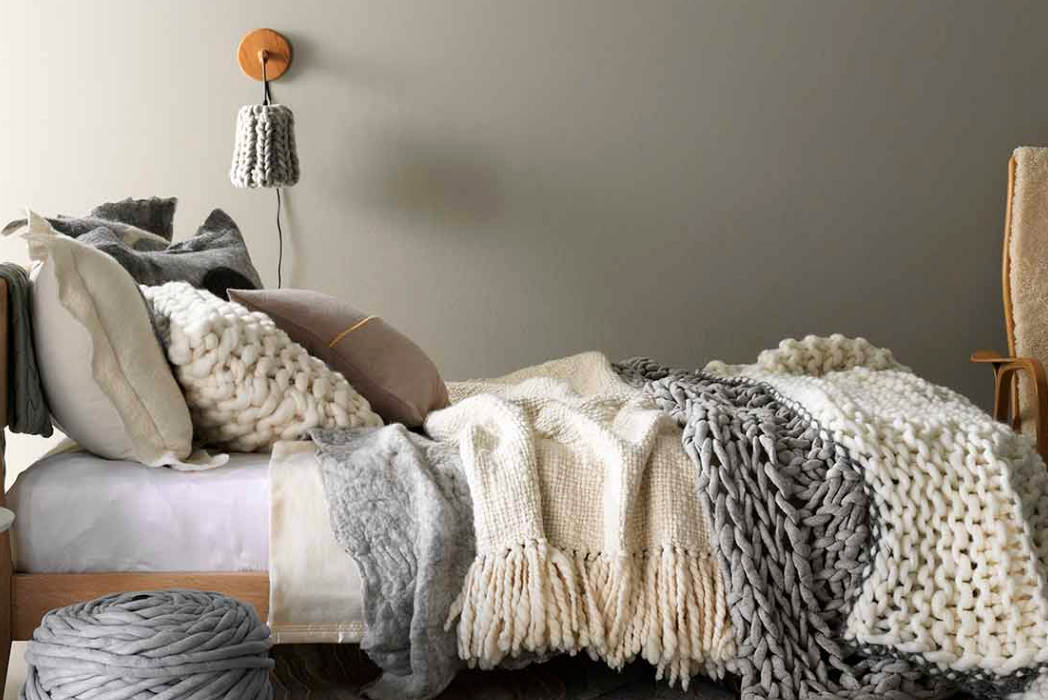Hello, we use cookies on our website to find out how many people visit the website and what services they are interested in. We can only use these files with your consent.
Sheep wool and better sleep
Research proves that wool helps maintain a more stable body temperature and combat sweating, thereby making a more comfortable sleep environment. In particular, wool has been shown to provide superior buffering of heat and moisture changes compared to other fibre types. This enables wool to protect against low or high temperatures and high humidity that have been shown to detrimentally affect sleep. The positive effects of sleeping with wool apply to people of all ages. However, because a person’s sleep quality and the ability to regulate body temperature generally decrease with age, wearing wool sleepwear and using wool bedding can particularly improve the quality of sleep of adults as they grow older.
Wearing wool sleepwear improves sleep quality
The latest study conducted by researchers at The University of Sydney has found adults wearing wool sleepwear fell asleep in just 12 minutes compared with 22 and 27 minutes for those wearing polyester and cotton.
“Wool helps regulate your body temperature, keeping you in what is known as 'the thermal comfort zone' for longer,” explains Associate Professor Chin Moi Chow from The University of Sydney. “You therefore not only fall asleep quicker, but also have deeper, less fragmented sleep.”
The study found these benefits were most relevant to older and poorer sleepers.
The effect of sleepwear and bedding on sleep at ambient temperatures
An earlier study, also conducted by The University of Sydney researched the effects of sleepwear fibre type and bedding on sleep at ambient temperatures of 17°C and 22°C.
Seventeen healthy young adults underwent 9 nights of polysomnography testing and found the time it took to fall asleep was significantly shortened when sleeping in superfine Merino wool, with trends of increased total sleep time and sleep efficiency compared to cotton sleepwear.
The group fell asleep faster on average when wearing Merino wool, taking 11 minutes whereas it took 15 minutes on average in cotton,. The research paper was published in the journal Nature and Science of Sleep (2016).
Merino wool bedding products officially recognised as asthma & allergy friendly®
The international certification body Allergy Standards Limited (ASL) has officially recognised bedding products made from Merino wool as asthma & allergy friendly®.
The development of the new certification standard (ASP: 02-25/101) was supported by peer-reviewed scientific papers and consultation with subject matter experts in the field of asthma and allergies.
The new asthma & allergy friendly® Certification Addendum for bedding containing Merino wool (ASP:02-25/101) was approved by the ASL Scientific Committee, reviewed by an independent panel of medical experts in the field of asthma and allergies and is now available for bedding manufacturers to test their products against and become certified.
Wool bedding
The comparative thermo-physiological advantages of wool blankets compared to cotton/acrylic blend blankets were shown by Umbach using laboratory measurements and human sleep studies. The author concluded that wool blankets deliver better thermal insulation, moisture transport, and moisture buffering than the cotton/acrylic blanket.
Another investigation found that wool underlays increased REM (Rapid Eye Movement) sleep periods and that wool bedding (duvets with or without underlays) increased REM sleep by 25% and allowed greater natural skin cooling associated with Stage 4 sleep. The subjects of this study also rated the wool bedding products as more comfortable.
Wool blankets demonstrated better thermal insulation, moisture transport, and moisture buffering than the cotton/acrylic blanket.
Adults sleeping on wool underlays have been shown to sleep more peacefully and wake feeling more refreshed (“feeling better”). Compared to other fibre types, wool underlays provide greater diffusion of pressure points, better insulation and better perspiration absorption making it more comfortable.
– Sufferers of fibromyalgia (diffuse chronic pain and presence of tender points) showed significant lessening of pain scores, and significantly improved assessments of sleep quality (Pittsburgh Sleep Quality Index) when sleeping on wool underlays.
– Affected patients needed to be turned or rolled less often on the sheepskin underlay and developed fewer pressure ulcers due to reduced moisture build-up from wool’s natural moisture transport and breathability.
This very solid and contemporary body of scientific evidence, which continues to grow, shows that wool is beneficial to a good night’s sleep for both older and younger adults. In particular, wool promotes a better sleep for poor sleepers. These research findings should give confidence to consumers to choose sleepwear and bedding made from wool in preference to products made from other fibres.














Comments
Discussion is empty.